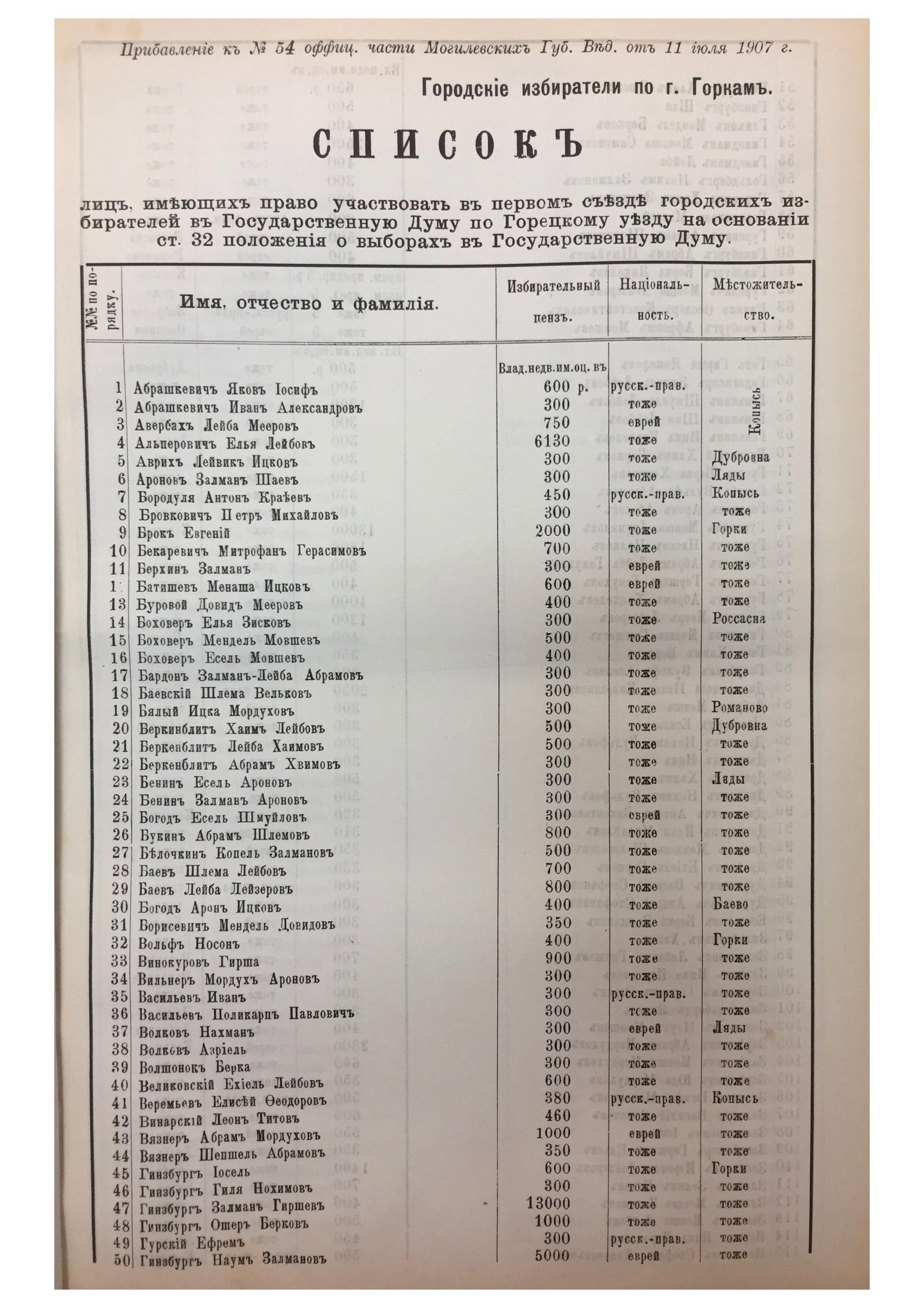
|
|
|
The Genealogical Research Division of

|
|
|
|
Duma Voter List DatabaseThis database contains the names of over 120,000 men of Grodno, Minsk, Mogilev and Vitebsk Gubernias who were eligible to vote in the Russian parliamentary elections in 1906 and 1907. These voter lists were published in the Russian government newspaper Gubernski Vedomosti. The Gubernskie Vedomosti were Czarist-era government newspapers, published in each gubernia between 1838 and 1917. These newspapers included official government notices, including these voters lists for the elections for the Russian parliament (Duma) were held (or supposed to be held) in 1906, 1907, and 1912. Both Jews and non Jews were eligible voters. We have primarily focused on Jewish voters. Because people can appear in multiple lists, the same information may appear in multiple lists. Grodno gubernia was comprised of nine districts (uyezds): Belostok (now in Poland), Bielsk (now in Poland), Brest, Grodno, Kobrin, Pruzhany, Slonim, Sokoka (now in Poland), Volkovysk. Minsk gubernia was a province of the Russian Empire until 1917. It was comprised of nine districts: Bobruisk, Borisov, Igumen, Minsk, Mozyr, Novogrudok, Pinsk, Rechitsa and Slutsk. Between the two world wars, the western third of former Minsk Gubernia was in Poland (southern Nowogródek and northeastern Polesie provinces); and the eastern two-thirds in the Soviet Union. Today, the vast majority of former Minsk gubernia is in south-central Belarus; small portions of southern Pinsk and Mozyr uyezds are in modern Ukraine. For more information on the Minsk gubernia Russian Duma voters' lists, see the Duma Voter List FAQ. Mogilev gubernia was comprised of eleven districts: Bykhov, Chausy, Cherikov, Gomel, Gorki, Klimovichi, Mogilev, Mstislavl, Orsha, Rogachev, Senno Vitebsk gubernia was comprised of nine districts: Drissa, Dvinsk (now in Latvia), Gorodok, Lepel, Liutsin (now in Latvia), Nevel, Polotsk, Rezhitsa (now in Latvia), Sebezh, Velizh (now in Russia), Vitebsk. Not all lists have been found or fully transcribed so if you are not finding family members, they might appear in future lists. All of the lists need more quality control review. Many of the records now have links to the original images so researchers can verify the transcriptions. We hope to have more lists transcribed and a better quality control for all online records in 2025. If you are interested in helping with the review of transcribed records, contact Paul Zoglin ([email protected]). Database Fields:The database contains the following columns of information:
Sample Record
Sample Duma Voter List Contents of the DatabaseThere are approximately 120,000 1906-1907 duma voter lists records for Grodno, Minsk, Mogilev and Vitebsk gubernias in the JewishGen Belarus database. Below is a detailed listing of the districts.
Translation/Transliteration MethodsTranslators are instructed to follow JewishGen transcription rules.� Unless otherwise noted, transliterations follow the BGN/PCGN Romanization of Russian and the YIVO Romanization Standard for Yiddish/Hebrew.� Records have been formatted according to JewishGen transcription templates. If the Hebrew/Yiddish name differs from the Russian name, both names are listed separated by a forward slash (/) Recommendations for SearchingSearch the records using the Daitch-Mokotoff Soundex as well as the exact name, due to variations in spelling and because some records were transliterated from Russian only and not Hebrew. Search all town records even if you believe you know the town your relatives came from. Families moved around quite a lot, so the records that you are searching for could be in any database.� Obtaining Copies of Original RecordsAll of the lists were published in the Vedomosti newspapers. Some of the original images are linked to in the record. By 2025 we hope to have links to all of the original images. AcknowledgementsThe Project Coordinators for the Minsk gubernia transcriptions were Risa Heywood and Riki Vered. Also thanks to all transliterators listed in the table above. Searching the DatabaseThis database is searchable via the JewishGen Belarus Database.
Last Update: August 16, 2024 PMZ
|

|
Edmond J. Safra Plaza | 36 Battery Place | 646.494.2972 | [email protected] | |

|